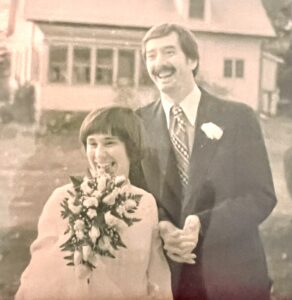In 1966, Margaret Franck was stationed in Punjab, India, serving the second year of her two-year volunteer term in the Peace Corps. She was eagerly anticipating her Christmas vacation week with fellow volunteers, when a traveling companion became ill. Margaret offered to accompany her friend to New Delhi to see a specialist. The Peace Corps Hostel, which allowed volunteers to stay for free, had closed, but a friend offered his New Delhi home — he and his roommates would be on vacation.
Jim Sparks, a Peace Corps volunteer stationed in New Delhi, was one of those roommates. While traveling by train to Bombay with a friend for Christmas vacation, things went awry and Jim decided to turn around. The cheapest fare meant enduring an agonizing 25-hour trip via third class in an open box car.
“It was extremely hot, with cinders and soot blowing in,” he recalled.
Showering and crawling into bed was his only priority, but upon seeing his occupied bed, Jim groaned in exasperation.
“It was 2 a.m. when I heard him come in,” Margaret said of the incident. “I got up and quickly offered to take the couch, but he had already stomped off.”
The interaction was “not the most auspicious first meeting,” according to Margaret, and while their paths crossed again through mutual friends in India, their connection hadn’t deepened.
In 1968, Jim returned to the United States and contacted Margaret after learning that she, too, lived in New York City.
“I longed for that connection to India,” Jim recalled of a common, well-documented post-assimilation crisis. “I didn’t have anyone to share all of this with. I had Margaret.”
Margaret invited Jim and another mutual friend to dinner.
“I had these wonderful slides from India to share,” she recalled.
But when the guests arrived, the slides were missing. Earlier that day at Lenox Hill Hospital, Margaret had presented her top 100 slides from her time in India.
“I left them on the subway,” she recalled.
In losing her slides, Margaret felt she had lost her connection to India.
“I was miserable,” she said. “And so was the night.”
Jim pursued their friendship, staying connected to Margaret even when her job took her to Washington, D.C.
“I still didn’t have a very positive view of Jim,” she said. “I was still a little embarrassed by that ‘incident’ in the bedroom. But he would send me Christmas cards and really tried staying in touch, calling whenever he came to Washington on business.”
During that time, Margaret recalled her feelings softening in a conversation with her sister. “You know who is getting better? Jim Sparks is getting a lot better. He is a nice person.”
In the years that followed, because of their shared values and extraordinary experiences in India, they found a safe haven in each other.
“How much of a positive impact India had on our lives is hard to convey,” Margaret said. “India was, and still is, an overpowering experience.”
In the summer of 1975, Jim came to see Margaret while on business. The conversation was easy, and both shared recent breakups. As Margaret drove past the Jefferson Memorial, she confided earnestly in Jim: “You know, I am over 30 years old. I’m afraid I’m not going to find anyone, and I am not going to be able to have children.” Jim’s candid reply stunned her. “Well, you know, if you decide that’s what you want, I’m available.”
Jim and Margaret will celebrate their 47th wedding anniversary this October. They have returned to India three times over the years — to the place where they first met, the place that forever resides in their hearts



